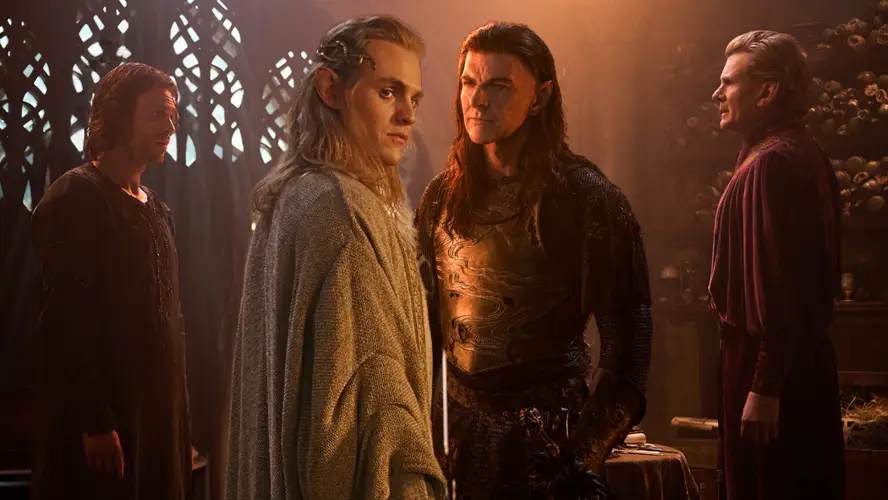
When Amazon announced The Lord of the Rings: The Rings of Power, fans of J.R.R. Tolkien’s beloved universe were filled with hope and anticipation. With a staggering budget of $715 million for its first season alone, this series was touted as the most expensive TV show ever produced. The cost wasn’t just for production—much of it went to acquiring the rights from the Tolkien estate and working out a rights agreement with Warner Bros, allowing the series to adapt content from the appendices of The Return of the King and The Hobbit. Despite these high costs, something has gone amiss. Fans and critics alike have noted that The Rings of Power lacks the soul and richness that made Peter Jackson’s original trilogy a timeless masterpiece.
The Unmatched Legacy of Peter Jackson’s Trilogy
Peter Jackson’s The Lord of the Rings trilogy, which began with The Fellowship of the Ring in 2001, set the gold standard for fantasy filmmaking. With its groundbreaking visuals, intricate storytelling, and deep respect for Tolkien’s work, Jackson’s adaptation created a sense of awe that lingers to this day. Each frame felt as if it was born out of a genuine love for Middle-earth and its characters. Whether it was the lush landscapes of New Zealand standing in for the sweeping beauty of Tolkien’s world or the meticulous care taken to make every costume, prop, and set piece feel real, Jackson’s films had heart—and that heart resonated with fans across the globe.
In contrast, The Rings of Power has been criticized for feeling like a hollow shell of what came before. Despite its eye-watering budget, the show often feels more like a rushed attempt to capitalize on the Lord of the Rings IP than a sincere effort to carry the legacy forward. But where exactly did it all go wrong?
The Feel of Old-School Theater, But Without the Soul
One of the biggest complaints about The Rings of Power is how, despite its immense production value, the show feels like a step backward. In an age of CGI-heavy blockbusters, the show has oddly been described as feeling more like old-school theater—and not in a good way. Many scenes feel overly staged, with stiff performances and a lack of the natural, immersive flow that characterized Jackson’s films. Even the grandeur of Middle-earth feels diminished. While the original trilogy balanced large-scale battles with intimate character moments, The Rings of Power struggles to capture that same magic.
Even more disappointing is the lack of emotional depth. The Rings of Power has been criticized for failing to create the same emotional resonance that made Jackson’s trilogy so beloved. Characters like Frodo, Aragorn, and Samwise Gamgee became icons because their personal struggles mirrored the larger fight against evil. But in Amazon’s series, the characters feel one-dimensional, often serving more as plot devices than as fully fleshed-out individuals that audiences can connect with.
A Missed Opportunity to Honor Fans and Tolkien’s Legacy
With so much history and fan loyalty behind it, The Rings of Power had an unprecedented opportunity to dive deeper into the lore of Middle-earth, explore its lesser-known stories, and enrich Tolkien’s world in a way that hadn’t been seen before. Unfortunately, rather than treating the Lord of the Rings IP with reverence, the series feels like it was made simply to cash in on a familiar name. The heart and soul that made Jackson’s trilogy such an enduring success are noticeably absent, replaced by a formulaic approach to content creation.
Many fans feel that The Rings of Power squandered the chance to build on Peter Jackson’s legacy. Instead of being an epic expansion of Tolkien’s world, it often comes across as an empty spectacle—a show that looks grand on the surface but feels cheap when compared to its predecessor. The decision to focus more on creating visually impressive (but often hollow) moments instead of delving into the complexity of Tolkien’s mythology has left many viewers feeling let down.
The High Cost of Missing the Mark
Amazon’s massive investment in The Rings of Power was meant to create something monumental, but when you compare it to Jackson’s original trilogy—films made on a fraction of the budget—the difference is striking. While Jackson’s films used every dollar wisely, pushing the boundaries of technology and practical effects to create a believable and lived-in world, The Rings of Power feels more like an exercise in excess. Despite the millions spent on CGI, elaborate sets, and marketing, the show lacks the soul and artistry that made The Lord of the Rings films timeless.
This failure to capture the magic of Tolkien’s universe also poses a long-term risk for the future of high-budget adaptations. As Hollywood continues to rely on established franchises, it’s essential to remember that audiences aren’t just looking for big-budget spectacles—they want stories with heart, characters with depth, and worlds that feel alive. If studios continue to prioritize profits over genuine storytelling, they may face the same grim future as Amazon’s venture into Middle-earth.
What Hollywood Can Learn
Hollywood’s recent obsession with franchise IPs has led to a proliferation of reboots, spin-offs, and sequels that are often seen as cash grabs. While there’s nothing wrong with revisiting beloved universes, it’s crucial to approach these projects with a long-term strategy and a deep understanding of what made the originals resonate with audiences in the first place. A focus on storytelling, character development, and world-building is far more important than flashy visuals and huge budgets.
If Hollywood can learn anything from The Rings of Power, it’s that no amount of money can compensate for a lack of soul. Studios need to return to the basics—telling good stories, respecting the source material, and giving audiences something they can emotionally invest in. When done right, adaptations can live on in the hearts and minds of fans for generations. But when done poorly, they risk fading into obscurity, no matter how much money is thrown at them.
In the end, The Rings of Power may serve as a cautionary tale for the entertainment industry. Studios can spend hundreds of millions of dollars, but if they fail to honor the legacy of beloved stories and the fans who cherish them, the result will always feel hollow. True success comes from heart, passion, and an unwavering commitment to storytelling—the very qualities that made The Lord of the Rings an enduring masterpiece.
